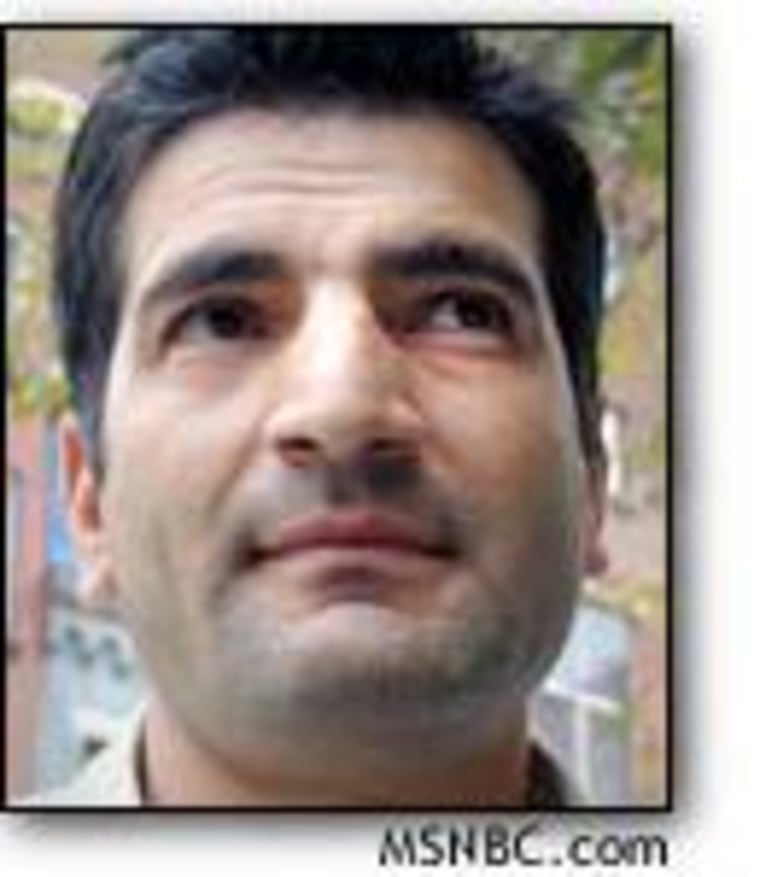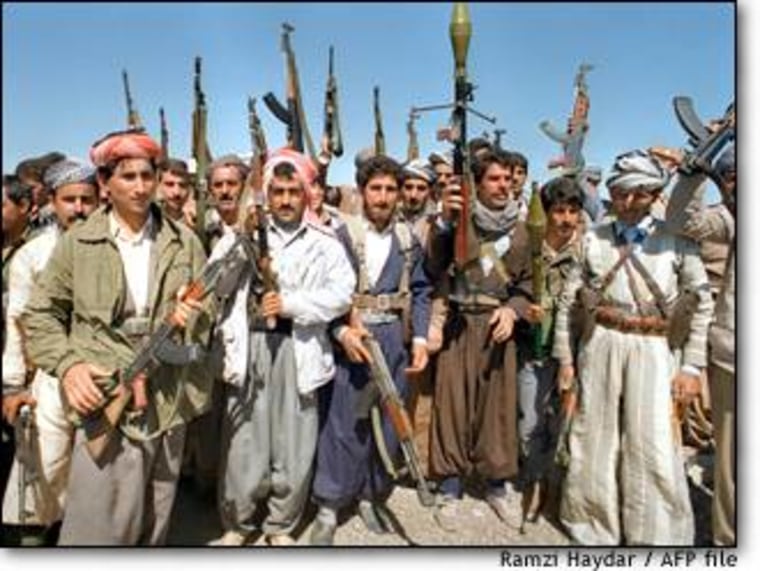Officially, Kurdistan has never existed. It’s only alive in the minds of millions of Kurds who dream of a homeland in a broad swath of territory that crisscrosses three continents and a half-dozen hostile nations. Now that the United States is mulling a new strike on Iraq, the Kurds are again key players — or maybe pawns — in a complex geopolitical game. It’s a deadly sport the Kurds have become accustomed to losing.
For now, the frontiers of Kurdistan are imaginary lines, penciled along a mountainous land the size of Texas, and carved along the war-scarred meeting places of the European, Eurasian and North African land masses.
Through the ages, Kurds have been ruled (and misruled) by the Ottoman empire, the Persian empire, the British empire and the Russian/Soviet empire.
Nowadays, the territory is jealously guarded by a slew of regional powers, including Turkey, Iran, Syria and Iraq, foes on many issues but united in their vigorous suppression of the Kurds.
Only in an enclave of northern Iraq have the Kurds experienced any semblance of independence, running their own affairs for the past 10 years under the protection of U.S. and British warplanes patrolling the so-called “no-fly zone.”
But that, too, is threatened as President Bush weighs military action to topple Saddam Hussein.
The Kurds are worried about both a pre-emptive Iraqi strike against the region — a past target for Saddam’s venom — as well as a Turkish incursion from the north.
And if the United States were to succeed in ousting the Iraqi leader, the divvying up of the spoils in a post-Saddam Iraq may not work in their favor.
“I have strong fears that we might lose [autonomy in Northern Iraq],” said Kani Xulam, head of the American Kurdistan Information Network, an advocacy group for Kurds based in Washington, D.C. “I don’t believe in violence, but I also oppose [U.S. military action] because it will make the situation worse for the Kurds.”
FEAR OF TURKEY
Of all the neighbors, Kurds view Turkey as the greatest threat. The country is home to 13-15 million Kurds, the largest concentration in the presumed territory of Kurdistan, and the Ankara government has been accused of brutally persecuting the ethnic group.
”[The Turks] basically have no truck whatsoever with anything that smacks of separatism,” said Anders Lustgarten of the London-based Kurdish Human Rights Watch, which has represented Kurds seeking reparation for abuses by Turkey before the European Court of Human Rights.
“They are very concerned if there is a federated Iraq and particularly if the Kurds get [the city of] Kirkuk and oil, it will become a place of potential emulation for Kurds in Turkey,” Lustgarten said.
Currently, Kirkuk remains under Saddam’s control and he has been accused of an aggressive campaign of “Arabization” in the oil-mining city aimed at displacing the Kurds with Iraqis more loyal to his regime.
Past victimization of the Kurds at the hands of Saddam has been frequently cited by U.S. administration officials as a reason for why the Iraqi leader should be ousted. In the worst case, at least 5,000 Kurds were killed instantly on March 16-17, 1988, (and thousands more subsequently) after Saddam unleashed chemical weapons against the city of Halabja.
A FEDERAL SOLUTION?
For its part, Turkey denies discriminating against its Kurds. A government spokesman framed the accusations in terms of the government’s 15-year war against the militant Kurdistan Workers Party or PKK, which has been designated a terrorist group by the United States.
As for the ordinary Kurds, the spokesman said they are treated like anybody else. “They are Turkish citizens.”
Since the defeat of the PKK in 1999, the government has eased restrictions on Kurds by allowing the publication and broadcast of the language.
But the mere trappings of statehood across the border in Iraq, coupled with a claim to Kirkuk as a capital and a plan for a meeting of a united Iraqi Kurdish parliament, is deeply troubling to the Turkish government. And in the past, it has not hesitated to move troops into northern Iraq to counter the threat of Kurdish militants although the government spokesman denied they were a presence there now.
But the Ankara government made its sentiments clear in an Aug. 21 statement, warning that the political parties in northern Iraq “must not forget the need to carefully avoid any assertions about the future of the country.”
Turkey’s defense minister even suggested that northern Iraq was rightly part of Turkey as it belonged to the Ottoman Empire.
“It is an area which had been forcibly separated,” Defense Minister Sabahattin Cakmakoglu said. “Northern Iraq is not a region that we will let fall prey to the ambitions of this or that group,” he said.
ANTI-SADDAM COALITION
Kurdish groups were among the hodgepodge of anti-Saddam groups invited to Washington last month for consultation with high-level U.S. officials, including Defense Secretary Donald Rumsfeld and Vice President Dick Cheney.
But the apparent enthusiasm for a “regime change” in Baghdad can’t hide the concern about life after Saddam.
On that score, the two political parties running northern Iraq, the Patriotic Union of Kurdistan led by Jalal Talabani and the Kurdistan Democratic Party of Masoud Barzani, carefully avoid the word independence.
“We support the integrity of Iraq and want to participate in the running of the affairs of Iraq on a federal basis,” said Nijyar H. Shemdin, U.S. Representative of Kurdistan Regional Government, the KDP-run enclave.
Shemdin declined to comment on the aspirations of Kurds in Turkey, telling MSNBC his government wanted good “neighborly relations” with all governments.
Talabani also asserted that independence is impossible, for practical reasons. “If we declare independence and assuming Turkey, Iran and Syria did not declare war on us and invade us but merely boycott us, how do we enter and exit from Kurdistan?” he asked in an interview with the Saudi Asharq al-Awsat newspaper. “Then there are states which threaten that if a state is declared it will occupy the area. We cannot resist the Turkish Army.”
THE DIASPORA
But outside the political sphere, the idea of self-determination is alive and well among the Kurd diaspora.
“It’s my dream,” said Muzaffer Coskun, a native of Sarikamis, a picturesque corner of eastern Turkey. “Most of the Kurds feel this; many people sacrifice for this, many people die for this,” he said.

Coskun, 32, now lives in the United States, where he fled in 1993 during the heyday of Turkey’s battle with the PKK.
After watching Turkish soldiers rampage through local villages, inflicting collective punishments on Kurds because of PKK attacks, Coskun said he had not choice but to flee.
“I had no choice: either I had to join the Turkish army (due to conscription) or the PKK. Thank God, I came here. If I was forced, I probably would have joined the PKK.”
The dream of self-rule is shared by Mehabad Salih, who hails from northern Iraq and is involved in social work with fellow Kurds in London.
“Every single, normal Kurdish person will tell you the same thing,” Salih said of aspirations for an independent Kurdistan. “We have our language, our culture, our lands where we have been living for thousands of years. We are not taking land from anybody.”
And in northern Iraq, the Kurds have proved that they can rule themselves, she added.
Salbest (who uses one name only), information officer at the Kurdish Cultural Center in London, asserted that a federal administration of Iraq after Saddam was crucial for the Kurds.
“Kurds as a nation have a right to be independent like other nations, but that depends on the political situation in the area.” Salbest said. “If they have the chance, they are going to have it, but they are facing the problem of neighbors [who don’t want it]. “They accept federalism at the moment,” he said.
(Sean Federico-O’Murchu is an international editor/writer for MSNBC.com)
